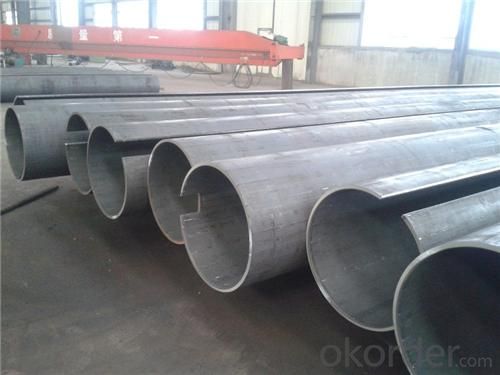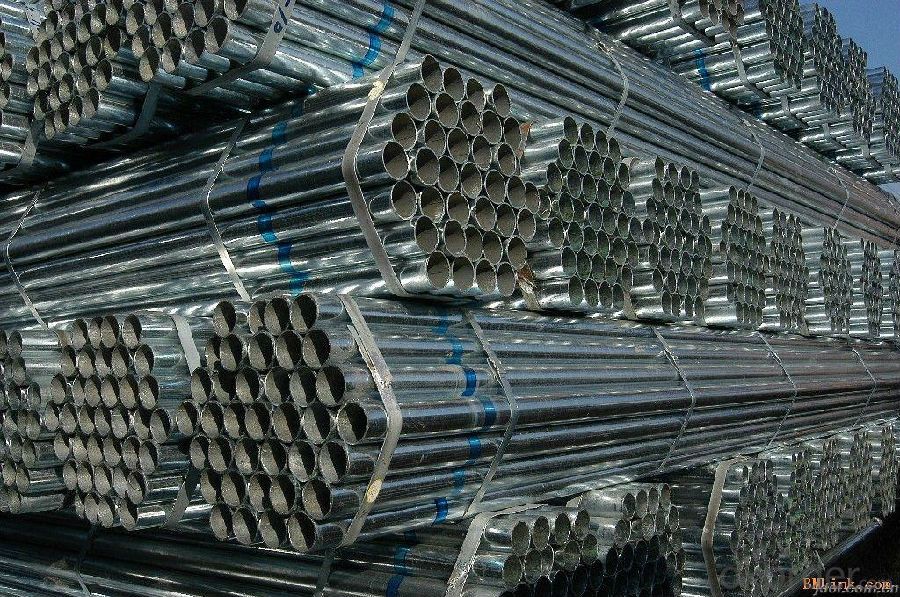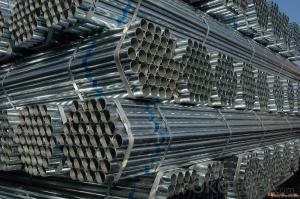Welded Black ERW Steel Pipe Water Pipe Oil Pipe
- Loading Port:
- China main port
- Payment Terms:
- TT OR LC
- Min Order Qty:
- 25 m.t.
- Supply Capability:
- 6000 m.t./month
OKorder Service Pledge
OKorder Financial Service
You Might Also Like
1、Structure of Welded ERW Steel Pipe API 5L:
API 5L ERW steel pipe is electric resistance welding, the abbreviation for ERW for transporting oil and natural gas vapor liquid objects, can meet the requirements of high and low pressure, the transport in the world with pipe sector accounted for a pivotal position.
2、Main Features of Welded Black ERW Steel Pipe API 5L:
• High manufacturing accuracy
• High strength
• Good visual effect
• Reasonable price
• Small inertia resistance
• Strong heat dissipation ability
3、Welded Black ERW Steel Pipe Specification API 5L:
Standard | GB, DIN, ASTM ASTM A106-2006, ASTM A53-2007 |
Grade | 10#-45#, 16Mn 10#, 20#, 45#, 16Mn |
Thickness | 1 - 33 mm |
Section Shape | Round |
Outer Diameter | 21 - 610mm |
Place of Origin | Tianjin, China (Mainland) |
Secondary Or Not | Non-secondary |
Application | Hydraulic Pipe |
Technique | Cold Drawn |
Certification | API |
Surface Treatment | factory state or painted black |
Special Pipe | API Pipe |
Alloy Or Not | Non-alloy |
Length | 5-12M |
Outer Diameter | 21.3-610mm |
Grade | 20#, 45#, Q345, API J55, API K55, API L80, API N80, API P110, A53B |
Standard | ASME, ASTM |
1) Material:20#(ASTM A 106/A53 GRB.API5LGRB,GB),45#,16Mn,10#.
2) Specification range:OD:21.3-610mm,WT:6-70mm,length:6-12m or according to the requirement of clients.
3) Excutive standards:GB,ASME API5L.ASTM A 106/A53,Despite of the above standards,we can also supply seamless steel pipe with standard of DIN,JIS,and so on,and also develop new products according to the requirements of our clients!
4) Surface:black lacquered,varnish coating or galvanized.
5) Ends:Beveled or square cut,plastic capped,painted.
6) Packing:bundles wrapped with strong steel strip,seaworthy packing.
4、Packaging & Delivery
Packaging Details: | seaworthy package,bundles wrapped with strong steel strip |
Delivery Detail: | 15-30days after received 30%TT |
5、FAQ of Welded Black ERW Steel Pipe API 5L:
①How is the quality of your products?
Our products are manufactured strictly according to national and internaional standard, and we take a test
on every pipe before delivered out. If you want see our quality certifications and all kinds of testing report, please just ask us for it.
Guaranteed: If products’ quality don’t accord to discription as we give or the promise before you place order, we promise 100% refund.
②How about price?
Yes, we are factory and be able to give you lowest price below market one, and we have a policy that “ for saving time and absolutely honest business attitude, we quote as lowest as possible for any customer, and discount can be given according to quantity”,if you like bargain and factory price is not low enough as you think, just don’t waste your time.Please trust the quotation we would give you, it is professional one.
③Why should you chose us?
Chose happens because of quality, then price, We can give you both.Additionally, we can also offer professional products inquiry, products knowledge train(for agents), smooth goods delivery, exellent customer solution proposals.Our service formula: good quality+good price+good service=customer’s trust
SGS test is available, customer inspection before shipping is welcome, third party inspection is no problem.
6、 Welded Black ERW Steel Pipe Images API 5L:


- Q:How are steel pipes insulated to prevent heat gain?
- Steel pipes are typically insulated using materials such as fiberglass, foam, or mineral wool. These insulation materials are wrapped around the steel pipes to create a barrier that reduces heat transfer. The insulation helps to prevent heat gain by minimizing thermal conductivity and keeping the temperature of the pipes stable, which is crucial for maintaining the integrity and efficiency of various industrial processes.
- Q:How are steel pipes used in building foundations?
- Steel pipes are often used in building foundations to provide structural support and stability. They can be driven into the ground to act as piles, which help transfer the weight of the building to the underlying soil or bedrock. Steel pipes can also be used for deep foundation systems such as drilled shafts or caissons, which are used in areas with weak or unstable soil conditions. Additionally, steel pipes can be utilized for underground drainage and utility systems within the foundation structure.
- Q:Are steel pipes suitable for underground irrigation pumping?
- Indeed, steel pipes prove to be a fitting option for underground irrigation pumping. Renowned for their robustness and resilience, steel pipes present themselves as an optimal selection for subterranean utilities. They boast the capacity to endure substantial pressure, ward off corrosion, and remain less susceptible to soil shifting or fluctuations in temperature. Moreover, steel pipes exhibit a lengthier lifespan when juxtaposed with alternative materials, thereby mitigating the necessity for frequent replacements. However, it remains imperative to guarantee meticulous coating or lining of the steel pipes to avert corrosion and to consistently examine and uphold them for their continued efficacy and durability.
- Q:Can steel pipes be used for mining applications?
- Yes, steel pipes can be used for mining applications. Steel pipes are commonly used in the mining industry for various purposes. They are often used for transporting fluids, such as water or slurry, in mining operations. Steel pipes are known for their durability, strength, and resistance to corrosion, making them suitable for underground mining environments where conditions can be harsh and corrosive. They can withstand high pressure and are able to handle the heavy loads associated with mining applications. Additionally, steel pipes can be easily welded and connected, allowing for efficient installation and maintenance. Overall, steel pipes are a reliable and cost-effective choice for mining applications.
- Q:What is the process of coating steel pipes?
- The process of coating steel pipes involves several steps. First, the pipes are cleaned to remove any dirt, rust, or other contaminants. Then, a primer is applied to enhance adhesion and provide a protective layer. Next, the pipes are coated with a specialized coating material, such as epoxy, polyethylene, or zinc, depending on the desired level of corrosion resistance. This coating is applied using various methods, including spraying, dipping, or wrapping. Finally, the coated pipes undergo a curing process, which allows the coating to harden and form a durable barrier against corrosion.
- Q:What is the dimensional stability of steel pipes?
- The ability of steel pipes to retain their shape and dimensions in different conditions and external forces is referred to as dimensional stability. Steel pipes are well-known for their exceptional dimensional stability due to the inherent properties of the material. Steel, being a strong and rigid material, can maintain its shape even when subjected to high pressure or temperature fluctuations. This characteristic makes steel pipes highly suitable for applications that demand stability and resistance to deformation, such as plumbing, oil and gas pipelines, and structural supports. In addition to its inherent strength, the dimensional stability of steel pipes is also a result of their manufacturing processes. These pipes are typically produced using methods like seamless or welded construction, ensuring uniformity and consistent dimensions throughout the pipe's length. This precise manufacturing contributes to the dimensional stability of steel pipes. Furthermore, steel pipes are often coated with various protective coatings to increase their resistance to environmental factors. These coatings, such as galvanization or epoxy coatings, not only provide corrosion protection but also enhance the dimensional stability of the pipes by adding an extra layer of strength and durability. In conclusion, the widespread use of steel pipes in different industries is largely attributed to their dimensional stability. Their ability to maintain their shape and dimensions, even in challenging conditions, guarantees reliable and long-lasting performance in various applications.
- Q:What are the different types of coatings used for external protection of steel pipes?
- There are several types of coatings commonly used for the external protection of steel pipes, including fusion bonded epoxy (FBE) coatings, three-layer polyethylene (3LPE) coatings, three-layer polypropylene (3LPP) coatings, and coal tar enamel (CTE) coatings. Each of these coatings provide different levels of corrosion resistance and durability, depending on the specific requirements of the project or application.
- Q:What are the common applications of steel pipes?
- Steel pipes are commonly used in various applications such as water distribution systems, oil and gas pipelines, structural support in buildings and bridges, sewage systems, heating and cooling systems, and industrial processes.
- Q:What are the different types of steel pipe coatings for chemical processing plants?
- There are several types of steel pipe coatings commonly used in chemical processing plants. These include fusion bonded epoxy (FBE) coatings, polyethylene (PE) coatings, polyurethane (PU) coatings, and solvent-based coatings. Each coating offers unique properties and advantages, such as corrosion resistance, chemical resistance, and abrasion resistance, to protect the steel pipes from the harsh environment and chemicals present in chemical processing plants.
- Q:There are multiple welded galvanized steel pipe outer diameter 108mm wall thickness 4mm length of 6 meters
- Galvanized steel pipe is divided into cold galvanized steel pipe, hot galvanized steel pipe, cold galvanized steel pipe has been banned, and the latter is also advocated by the state for the moment, can be used. In 60s and 70s, developed countries began to develop new types of pipes, and galvanized pipes were banned. China's Ministry of construction and other four ministries also issued a civilization, indeed from two, 000 years since the galvanized pipe as a water supply pipe, the New District cold water pipe has rarely used galvanized pipe, and some of the hot water pipe is galvanized pipe. Hot dip galvanized steel pipe is widely used in fire, power and highway.
1. Manufacturer Overview |
|
|---|---|
| Location | |
| Year Established | |
| Annual Output Value | |
| Main Markets | |
| Company Certifications | |
2. Manufacturer Certificates |
|
|---|---|
| a) Certification Name | |
| Range | |
| Reference | |
| Validity Period | |
3. Manufacturer Capability |
|
|---|---|
| a)Trade Capacity | |
| Nearest Port | |
| Export Percentage | |
| No.of Employees in Trade Department | |
| Language Spoken: | |
| b)Factory Information | |
| Factory Size: | |
| No. of Production Lines | |
| Contract Manufacturing | |
| Product Price Range | |
Send your message to us
Welded Black ERW Steel Pipe Water Pipe Oil Pipe
- Loading Port:
- China main port
- Payment Terms:
- TT OR LC
- Min Order Qty:
- 25 m.t.
- Supply Capability:
- 6000 m.t./month
OKorder Service Pledge
OKorder Financial Service
Similar products
New products
Hot products
Related keywords































